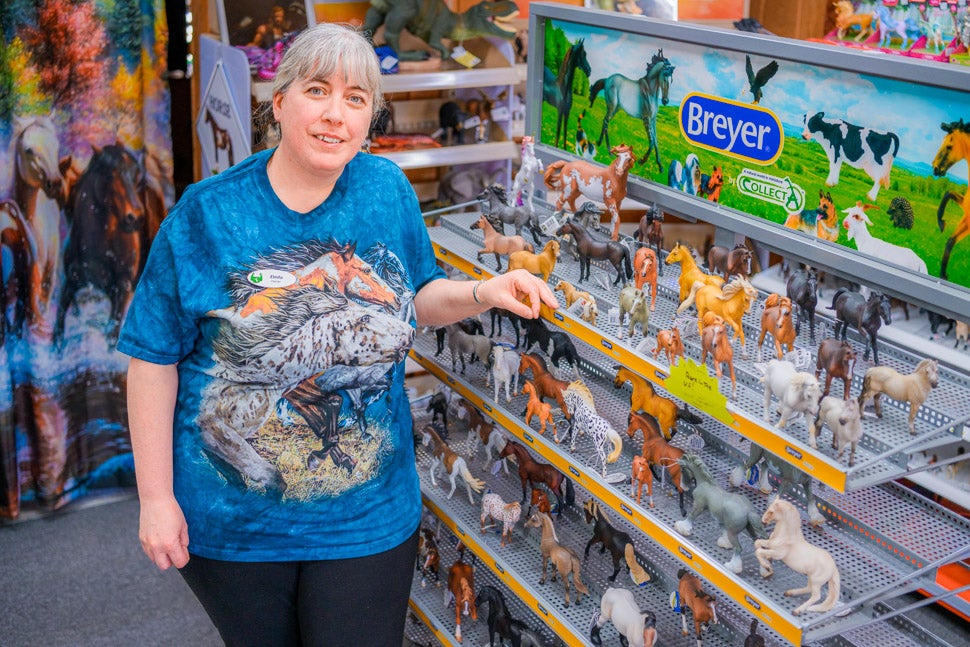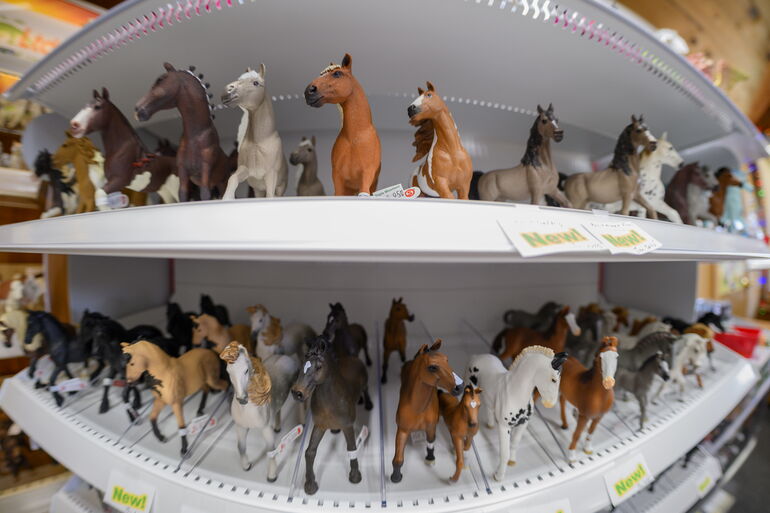Small toy businesses in Maine are coping with ever-changing tariffs, supply chain hiccups and rising prices. They include a specialty store in Hiram that has had to raise prices on imported model horses.
Get Instant Access to This Article
Subscribe to Mainebiz and get immediate access to all of our subscriber-only content and much more.
- Critical Maine business news updated daily.
- Immediate access to all subscriber-only content on our website.
- Bi-weekly print or digital editions of our award-winning publication.
- Special bonus issues like the Mainebiz Book of Lists.
- Exclusive ticket prize draws for our in-person events.
[bypass-paywall-buynow-link link_text="Click here to purchase a paywall bypass link for this article"].
Two painted plastic horses stand guard outside a treasure trove of toys in rural Hiram. Housed in a little green wooden hut, Triple Mountain is a purveyor of model horses owned and run by Eleda Towle. Her welcoming committee — a mare named Treasure and a foal called Jewel — are dappled with identifiable shapes including a lobster, horseshoe and map of Maine.

“Come in and play horses,” Towle says one weekday morning as she opens the door to 1,500 toys — mostly horses, along with other animals and Lego kits — stacked from ceiling to floor.
Inside this world of make-believe where collectors gather every Sunday for show-and-tell, however, the harsh reality of global trade disruptions is making itself felt.
Three days after this reporter visited, the self-appointed collector-in-charge spent five hours changing price tags after getting the news about a 10% cost increase from Breyer, her main supplier of model horses made in China. Relieved that the hike wasn’t as high as the 145% tariff that was reduced to 30% for 90 days on May 12 amid U.S.-China trade talks, Towle says the impact for small businesses remains unchanged. In a worst-case scenario if 145% import duties are reactivated, that could push the retail price of a $50 item like Breyer’s Highland and Shetland Pony two-pack plus accessories to $122.50 — and potentially force the online and bricks-and-mortar merchant out of business.
“If I had to close the store and it wasn’t viable anymore, I think we’d be OK, but it’s not something we’d want to do,” says Towle, decked out in a horse-themed T-shirt, rainbow-colored sneakers and earrings. She and her husband, both of whom spent their careers in retail, live up the hill where they’ve turned their garage into a climate-controlled toy warehouse.
“We just try to keep our chin up and hope for the best,” she says.
That option is slipping away faster than Secretariat — available in model form at the store — ran the Kentucky Derby. Rising costs and supply-chain hiccups sparked by trade tensions are disrupting toy businesses from big chains and producers to mom-and-pop shops in the most remote corners of Maine. The state’s $300 million-plus toy industry is powered mainly by small manufacturers, wholesalers and distributors supporting more than 1,400 jobs.
Caught in the crosshairs

With 80% of all U.S. toys manufactured in China, tariffs are pushing up prices. Mattel Inc., the global toy producer, is also feeling the heat; the maker of Barbie, Ken and the new LeBron James doll reported a first-quarter loss on May 5 and said it will reduce its reliance on production in China. The company also said it will focus on selling less expensive toys like the best-selling $1 basic Hot Wheels cars.
The impact of tariffs on the $42 billion U.S. toy industry as a whole is reflected in a recent survey by the Toy Association, a New York-based trade group urging a return to zero tariffs on toys.
Out of 400 small and medium-sized toy companies polled by the trade group in April, close to half said they expect to go out of business within weeks or months due to U.S. tariff policy.
Among mid-sized players, 87% are delaying orders and 80% are cancelling them. Their smaller peers are faring only slightly better, with 81% delaying orders and 64% cancelling.
“Christmas 2025 at risk,” the group declared in April. “Tariffs of 145% on Chinese imports have frozen the toy production supply chain, having a devastating impact on SMEs, many of whom are family-owned … including high levels of cancelled orders and significant cancelled purchases, which will quickly result in loan defaults and bankruptcies.”
Taking its case to the top level, the group has urged President Donald Trump’s administration to exempt all toys imported from China from tariffs. Beyond the short-term effort to save holiday sales this year, the group is demanding an exemption on toy import taxes in bilateral trade talks. That would be in line with the “zero for zero” tariff structure on toys laid out in the 1994 General Agreement on Tariffs and Trade, recognizing toys’ essential role to foster learning.
The Toy Association also notes that the International Emergency Economic Powers Act — a U.S. law giving the president broad authority to regulate international economic transactions during a national emergency — exempts books and other educational materials from trade restrictions.
Brushing aside concerns about shortages and price increases, Trump has said, “Well, maybe the children will have two dolls instead of 30 and maybe the two dolls will cost a couple of bucks more than they would normally.” Trump also defended tariffs after official data showed the U.S. economy shrank by 0.3% in the first quarter — its first retreat in three years — and has hinted that duties on pharmaceutical imports could be next.
In the toy world, constantly changing policies are making it hard for businesses to plan ahead. Another hurdle for small businesses is the end of a special exemption that prevented tariffs from being imposed on packages from China worth less than $800.
“We’ve always made sure our orders stayed under that amount, which makes it easier for us to budget,” says Towle. She also recently stopped sending packages by regular mail to customers and shifted to UPS, which she finds more reliable though it’s also more expensive.
‘Less competition and choice’
Amir Mousavian, an associate dean and supply-chain management professor at the University of New England College of Business, predicts a “profoundly disruptive” impact on U.S. toy retailers, particularly small, independent stores with far less wiggle room on prices than chains.
“Toys are a highly seasonal, price-sensitive product category, and such a steep tariff [of 145%] would either drastically raise consumer prices or squeeze retailer margins to unsustainable levels,” he says.
Since small retailers typically operate on thinner margins than national chains, their ability to absorb added costs is extremely limited, he notes.
“For some, it could mean cutting product lines, reducing inventory variety or even exiting the category altogether,” he says. “Over time, this could lead to less competition and choice for consumers, especially in small towns and rural areas.”
Another complicating factor is the expected stoppage this month of all container ships from China to major U.S. ports.
“Toys are a seasonal business, and inventories for the back-to-school and holiday seasons typically start arriving in late spring and summer,” Mousavian says. “If container ships from China stop coming in mid-May, most retailers would have enough inventory to last through summer, but by early fall — and certainly by the fourth quarter — many shelves could begin to look sparse. Large retailers may have some buffer through existing inventory in distribution centers, but small retailers typically rely on frequent, smaller shipments and would feel the pinch much quicker, perhaps within 8 to 12 weeks.”
Even if trade routes reopen, Mousavian says it would likely take six to eight weeks for shipments to arrive for retailers to start replenishing shelves – where even a short disruption for seasonal products like toys tied to holidays or movie releases means missing critical sales windows.
Fast-changing policies on trade are also hard on businesses trying to plan ahead.
“Overall, there’s a lot of concern not just with how the tariffs are going to be implemented, but by the whiplash effect,” says Curtis Picard, president and CEO of the Retail Association of Maine. “We’re in the time period when retailers are looking to place orders for the holiday season, so being able to forecast what items cost and pricing are front of mind.”
Stocking up the toybox
Maine toy merchants grappling with cost increases and supply chain bottlenecks are responding in different ways. While some are raising retail prices, others are getting a jump start on orders before tariffs kick in and shifting business models.
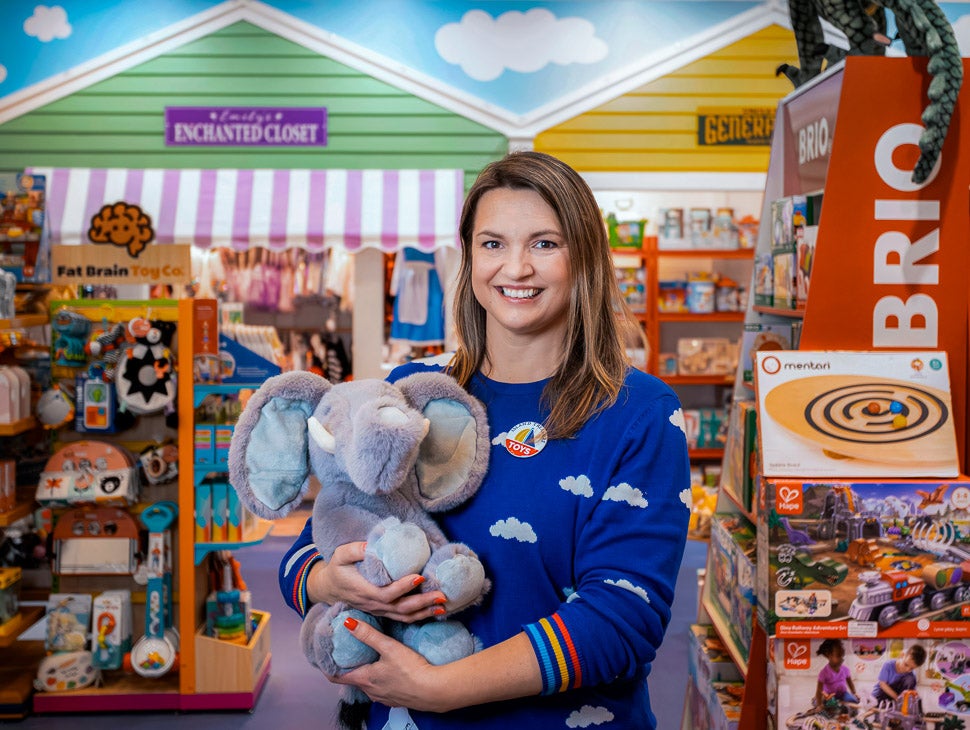
Those who are stocking up include Emily and Paul Drappi, owners of Island Treasure Toys, which had stores in Bath, Freeport and Yarmouth when they bought the business in 2019. They have since expanded, adding stores in Kennebunkport (in 2021) and Brunswick (in 2024). Last September, they moved the Freeport store to a bigger and more prominent spot on Main Street in a historic former library building they rent from the town.
“We’ve seen a few increases, but nothing major just yet,” Emily says in an early May phone interview hours after unpacking multiple big orders, including Legos. “We’re trying to stock up as much as we can because we know the last shipments of pre-tariff toys are arriving on the West Coast right now. The pressure’s on to get it in now before the prices go way up.”
The couple normally places holiday orders in June, which is also when Emily hopes to get a steer on what suppliers are thinking at an upcoming trade show.
“We’re getting a little bit ahead of the curve from where we start our holiday buying so that we can get some of our best-sellers in earlier,” she says.
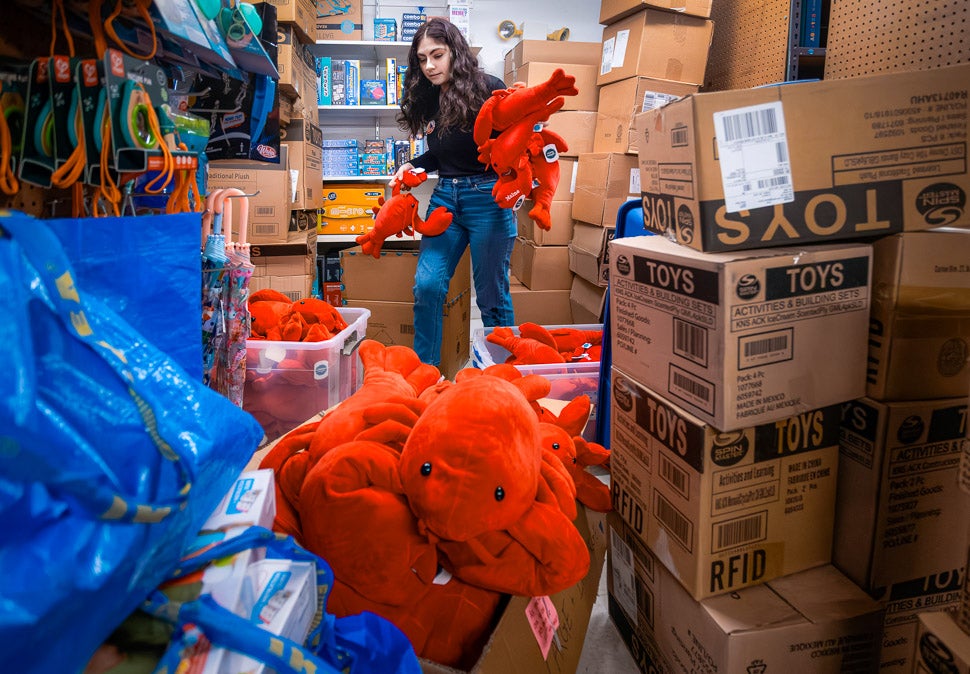
Not too rattled about a tariff situation he expects to be resolved soon, Paul Drappi adds that “we made it through COVID right off the bat, and we’re pretty optimistic that whatever happens we’ll be able to navigate through it and have had enough success to be confident in that.”
Puzzle maker reshapes business strategy
Elms Puzzles, an artisanal maker of hand-cut wooden puzzles in Harrison, is also feeling the effects of tariffs even though it gets almost all of its materials from U.S. vendors.
Sales momentum has slowed from 54% year-on-year-growth at the end of March to only a 6% bump as of the end of April, according to Chris Danner, who owns the business with his parents. He attributes the softening to a decline in consumer sentiment, especially when it comes to shelling out for a premium product that retails for $3 a piece or $3,000 for a 1,000-piece puzzle.
“Elms is a wonderful example of how nuanced and complex these trade issues really are,” says Danner. “Elms is ‘made in America’ soup to nuts, and yet we have been feeling the effects of these polices in a few different ways.” That shows “how interconnected the global supply system is, even for a little puzzle company like ours.”
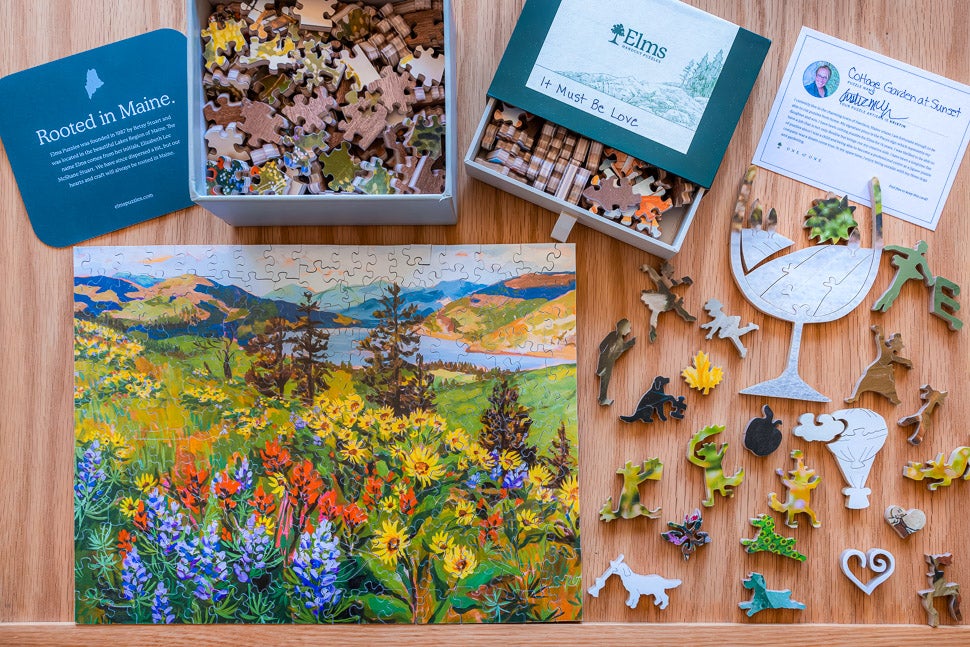
While costs have not yet risen to the point where the company feels like it needs to increase prices, Danner says that “if we see another couple of months of this, then we’ll get to harder decisions.” In the meantime, the company is promoting puzzle rentals as a less expensive alternative to buying.
“People love jigsaw puzzles. I don’t think that will ever change,” he says. “Maybe folks are pausing before that final click at checkout, but the fundamental demand is still there. We just need to ride this out.”
Similarly in Hiram, Triple Mountain sells used vintage toys in addition to new models like the Breyer ones made from cellulose acetate in China. Towle currently works with 10 consignors, including Harvest Hills Animal Shelter whose donated models are housed in a display case behind glass. She’s raised $10,000 to date from those sales for the Fryeburg nonprofit.
On the for-profit side of her business, Towle was still awaiting price updates from two other suppliers — one in Germany and the other in the U.S. — as this article went to press.
Grateful for the “little buffer” from consignment sales, she says, “Hopefully that will give us that little Band-Aid to get through this.”
